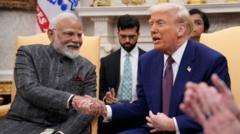Both leaders acknowledged existing trade tensions, with Trump singling out India’s elevated tariffs as a critical issue, labeling them a significant obstacle to better trade relations. In a bid to alleviate these impending trade barriers, Modi expressed his willingness to lower tariffs on American goods, repatriate undocumented Indians in the US, and procure advanced military aircraft, including F-35 fighter jets from the United States. At a joint press conference, Modi embraced Trump’s campaign sentiment by coining the phrase "Make India Great Again," or MIGA, suggesting synergistic growth could be achieved—the "Mega partnership for prosperity."
Trump reiterated the US commitment to bolster oil and gas sales to India, emphasizing the necessity of these resources for the Indian economy, as it already heavily relies on oil imports. Economists underscored that while the move is beneficial, India must navigate the potential economic strain of purchasing more expensive US energy due to a stronger dollar.
In addition to trade talks, the two leaders tackled immigration concerns affecting bilateral relations. Trump asserted that the US would expedite the extradition of a suspect linked to the 2008 Mumbai terror attacks, while Modi agreed to facilitate the return of undocumented Indian nationals residing in the US. Recently, a contingent of 104 Indians faced deportation, showcasing the challenges faced by undocumented immigrants in America.
As Modi and Trump outlined their mutual interests, Trump's administration remained wary of global trade dynamics, signaling potential tariffs that might impact not only India but also allies, including tariffs on agricultural goods that significantly differ among nations.
This meeting symbolizes a pivotal moment in US-India relations, setting the stage for future diplomatic and economic engagements as both countries work to address longstanding issues while promoting shared interests.
Trump reiterated the US commitment to bolster oil and gas sales to India, emphasizing the necessity of these resources for the Indian economy, as it already heavily relies on oil imports. Economists underscored that while the move is beneficial, India must navigate the potential economic strain of purchasing more expensive US energy due to a stronger dollar.
In addition to trade talks, the two leaders tackled immigration concerns affecting bilateral relations. Trump asserted that the US would expedite the extradition of a suspect linked to the 2008 Mumbai terror attacks, while Modi agreed to facilitate the return of undocumented Indian nationals residing in the US. Recently, a contingent of 104 Indians faced deportation, showcasing the challenges faced by undocumented immigrants in America.
As Modi and Trump outlined their mutual interests, Trump's administration remained wary of global trade dynamics, signaling potential tariffs that might impact not only India but also allies, including tariffs on agricultural goods that significantly differ among nations.
This meeting symbolizes a pivotal moment in US-India relations, setting the stage for future diplomatic and economic engagements as both countries work to address longstanding issues while promoting shared interests.




















